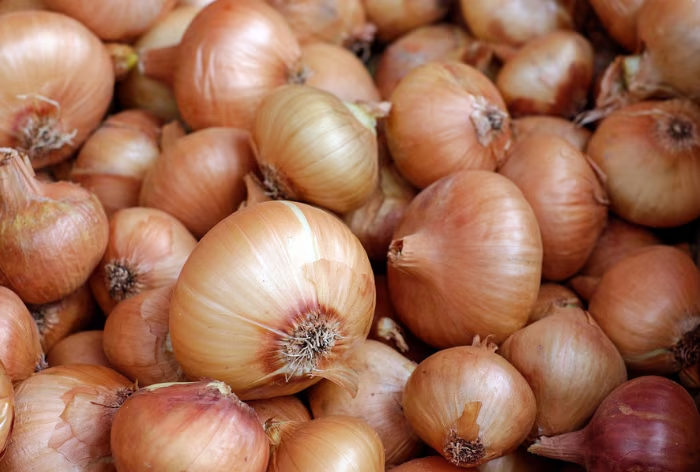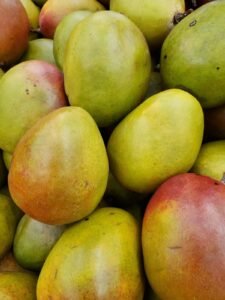The Central Government Allows Onion Exports to Six Countries


This decision by the Central Government comes as a relief to the onion farmers and traders who have been facing a slump in prices due to a bumper crop this year. With the surplus production, the government had initially imposed a ban on onion exports in September to stabilize the domestic prices. However, with the prices now stabilizing and the demand from neighboring countries increasing, the government has decided to lift the ban and allow limited exports.
The decision to allow exports to these specific countries was made after careful consideration of various factors such as their proximity to India, existing trade relations, and the demand for onions in these markets. Bangladesh, for example, is one of the largest importers of Indian onions and has been facing a shortage due to crop failure. By allowing exports to Bangladesh, the government aims to address the shortage and maintain a good trade relationship with the neighboring country.
The UAE, another major importer of Indian onions, has also been granted permission for exports. The UAE has a large Indian diaspora, and onions are a staple in their cuisine. Allowing exports to the UAE not only ensures a steady supply of onions for the Indian community but also strengthens the economic ties between the two countries.
Bhutan, Bahrain, Mauritius, and Sri Lanka have also been included in the list of countries allowed to import Indian onions. These countries have shown a consistent demand for Indian onions and have established trade relations with India. By catering to their onion requirements, India can further enhance its export market and strengthen diplomatic ties with these nations.
The volume of onion exports has been set at 99,150 metric tonnes, which will ensure a balanced supply in the domestic market while meeting the demand of the neighboring countries. The government will closely monitor the exports to ensure that there is no shortage of onions in the domestic market and that the prices remain stable.
This decision by the Central Government is expected to benefit the onion farmers and traders by providing them with an additional market for their produce. It will also help in reducing the surplus stock and preventing wastage of onions. Overall, this move is a step towards promoting agricultural exports and boosting the economy.
NCEL plays a crucial role in facilitating onion exports to the designated countries. As the appointed agency responsible for this task, NCEL ensures a smooth and efficient process of exporting onions. The government has allocated specific quotas for each country based on their requirements, and it is NCEL’s responsibility to ensure that these quotas are met.
One of the primary objectives of NCEL is to encourage domestic onion producers to export their produce. They do this by offering a platform where producers can sell their onions at the L1 price. This price is set to be competitive in the international market, ensuring that domestic producers can benefit from exporting their onions.
To further facilitate the process, NCEL has established partnerships with agencies selected by the destination governments. These agencies are responsible for purchasing the onions from domestic producers on a 100% advance payment basis. This not only provides financial security to the producers but also ensures that the export process is carried out smoothly.
In determining the offer rates for the onions, NCEL takes into account various factors. They consider the prevailing prices in the destination countries, as well as the international and domestic markets. By doing so, NCEL ensures that the offer rates are fair and competitive, benefiting both the producers and the destination countries.
Overall, NCEL’s role in onion exports is vital in promoting the growth of the domestic onion industry and meeting the demands of the designated countries. Through their efficient processes and strategic partnerships, NCEL plays a significant role in facilitating the export of onions and contributing to the economic development of the country.
Importance of Onion Exports and Domestic Availability
The decision to allow onion exports comes at a time when there is a need to ensure adequate domestic availability of onions. The projected lower kharif and rabi crops in 2023-24 have raised concerns about the availability of onions in the domestic market. By allowing exports to neighboring countries, the government aims to strike a balance between domestic demand and export opportunities.
Maharashtra, being the largest onion producer in the country, plays a crucial role in supplying onions for export. The onions processed by NCEL for export are primarily sourced from Maharashtra. The government has also allowed the export of 2,000 metric tonnes of white onion, which is exclusively grown for the export markets in the Middle East and some European countries.
The importance of onion exports cannot be overstated. India is one of the largest onion producers in the world, and its exports contribute significantly to the country’s economy. The decision to allow onion exports not only benefits the farmers but also strengthens India’s position in the global onion market.
The export of onions to neighboring countries creates a positive trade balance and enhances diplomatic relations. These exports not only generate revenue but also promote international trade and cooperation. By exporting onions, India can showcase its agricultural prowess and establish itself as a reliable supplier in the global market.
Furthermore, the export of white onions specifically grown for the Middle East and European countries opens up new avenues for trade. These markets have a high demand for white onions, and India’s ability to meet this demand strengthens its position as a key player in the global onion trade. The export of white onions not only diversifies India’s export portfolio but also helps in maintaining a stable domestic onion market.
However, while promoting onion exports, it is crucial to ensure that there is enough supply for the domestic market. Onions are a staple ingredient in Indian cuisine, and any shortage can lead to price hikes and inconvenience for consumers. Therefore, the government must strike a delicate balance between meeting domestic demand and exploring export opportunities.
To ensure adequate domestic availability, the government should implement measures to boost onion production. This includes providing farmers with access to quality seeds, advanced farming techniques, and necessary infrastructure. Additionally, the government should invest in research and development to improve onion yields and reduce post-harvest losses.
In conclusion, the decision to allow onion exports is a strategic move that benefits both the farmers and the country’s economy. By striking a balance between domestic demand and export opportunities, India can strengthen its position in the global onion market while ensuring adequate onion availability for its citizens. The export of white onions also opens up new avenues for trade and showcases India’s agricultural prowess on the international stage. However, it is crucial to implement measures to boost onion production and avoid any shortage in the domestic market.
In addition to the initiatives mentioned above, the government is also taking steps to address the challenges faced in onion procurement and storage. One of the major challenges is the lack of proper infrastructure for onion storage. The government is investing in the construction of modern onion storage facilities across the country. These facilities are equipped with advanced technologies such as controlled atmosphere storage, which helps in maintaining the quality and freshness of onions for a longer period of time.
Furthermore, the government is also promoting the use of post-harvest technologies to reduce losses during storage and transportation. Technologies such as onion drying and dehydration are being encouraged to increase the shelf life of onions and minimize wastage. These technologies not only help in reducing post-harvest losses but also provide an opportunity for value addition and export of processed onion products.
Another challenge in onion procurement is the lack of proper market linkages for farmers. Many small-scale farmers face difficulties in accessing markets and getting fair prices for their produce. To address this issue, the government is working on strengthening the existing market infrastructure and establishing direct linkages between farmers and consumers. This will not only ensure better prices for farmers but also reduce the involvement of middlemen in the onion supply chain.
Additionally, the government is also focusing on increasing the use of technology in onion procurement and storage. Mobile applications and online platforms are being developed to facilitate direct communication between farmers and procurement agencies. These platforms provide real-time information on market prices, demand, and supply, enabling farmers to make informed decisions regarding onion cultivation and sale.
Moreover, the government is promoting the adoption of good agricultural practices among onion farmers. Training programs and workshops are being conducted to educate farmers about the latest cultivation techniques, pest and disease management, and post-harvest handling practices. By implementing these practices, farmers can improve the quality of their onions and reduce post-harvest losses.
In conclusion, the government is taking several initiatives to address the challenges faced in onion procurement and storage. By investing in infrastructure, promoting post-harvest technologies, strengthening market linkages, and encouraging the use of technology and good agricultural practices, the government aims to ensure a stable and sustainable onion market in the country.




